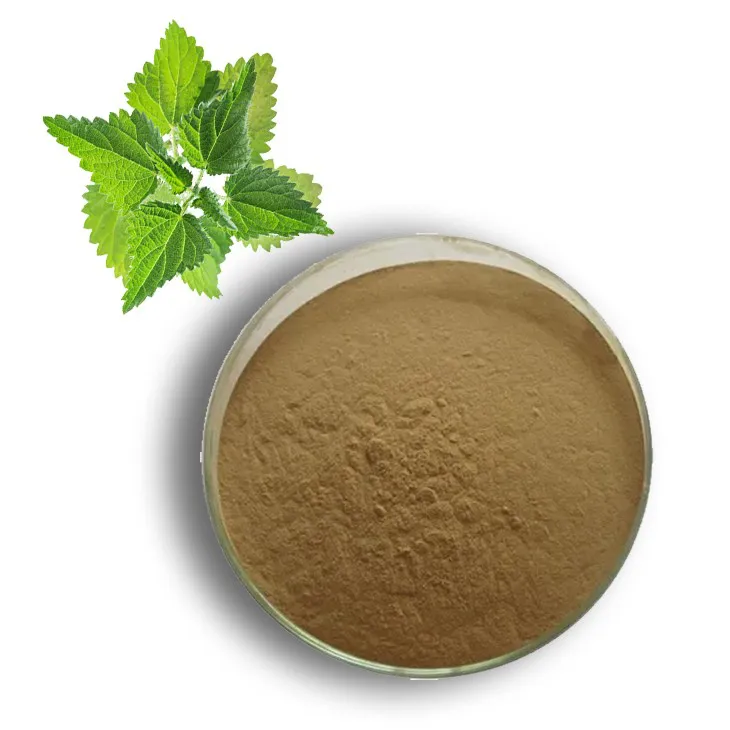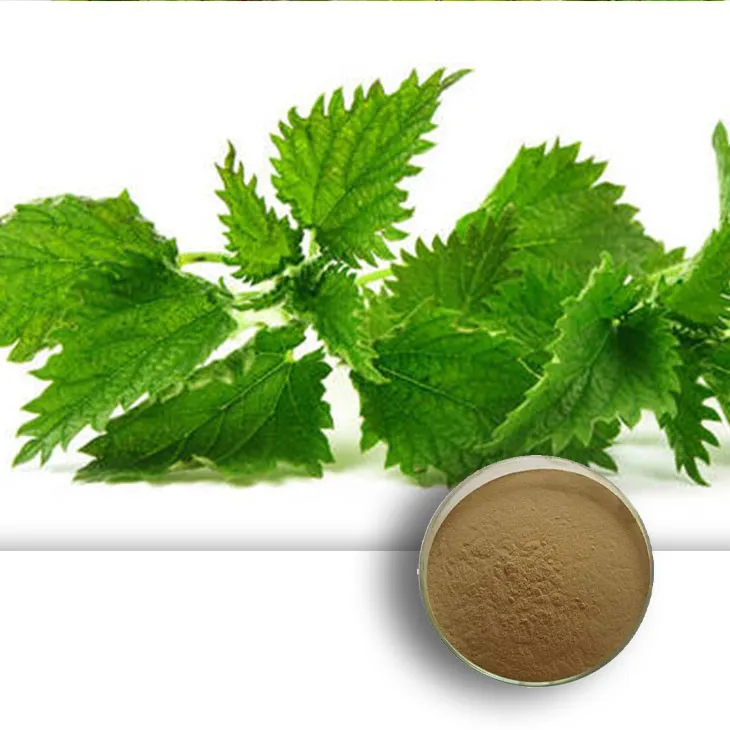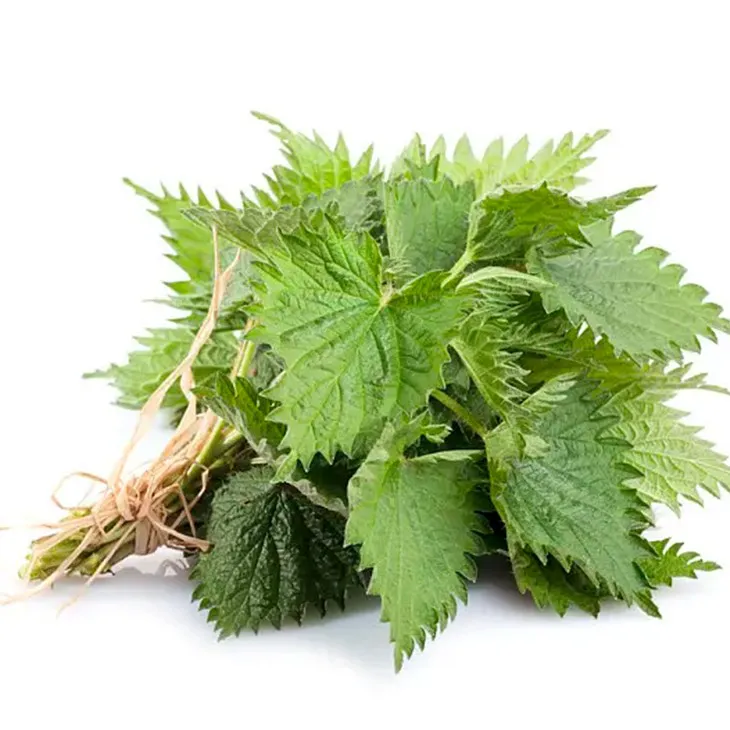- 0086-571-85302990
- sales@greenskybio.com
Active ingredients in nettle leaf extract.
2024-11-28

Introduction
Nettle (Urtica dioica) has been used for centuries in traditional medicine. The Nettle leaf extract is a rich source of various bioactive compounds. Understanding the active ingredients in Nettle leaf extract is crucial as it can open up new avenues for its use in different applications such as phytotherapy (the use of plants for medicinal purposes) and nutraceutical development (the development of products from food sources with health - promoting properties).

Terpenoids in Nettle leaf extract
Types of Terpenoids
Nettle leaf extract contains different types of terpenoids. Monoterpenes, sesquiterpenes, and diterpenes are some of the common terpenoids found. These terpenoids are synthesized through the mevalonate pathway in the plant cells.Antimicrobial and Antifungal Properties
Terpenoids in nettle leaf extract have shown significant antimicrobial and antifungal activities. For example, some terpenoids can disrupt the cell membrane of bacteria and fungi. They can interfere with the lipid bilayer of the microbial cell membranes, leading to leakage of intracellular components and ultimately cell death. This makes them potential candidates for the development of natural antimicrobial agents. In addition, terpenoids may also inhibit the growth and reproduction of microbes by interfering with their metabolic pathways.
Fatty Acids in Nettle Leaf Extract
Composition of Fatty Acids
Nettle leaf extract contains a variety of fatty acids. These include saturated fatty acids like palmitic acid and stearic acid, as well as unsaturated fatty acids such as oleic acid and linoleic acid. The ratio of saturated to unsaturated fatty acids in the extract can vary depending on factors such as the plant's growth conditions and the extraction method used.Impact on Membrane Structure and Function
Fatty acids play a crucial role in influencing membrane structure and function. In cell membranes, fatty acids are incorporated into phospholipids. Unsaturated fatty acids, with their double bonds, introduce kinks in the fatty acid chains. This affects the fluidity of the membrane. In nettle leaf cells, the fatty acids help maintain the integrity of the cell membranes. In addition, when consumed as part of the nettle leaf extract in a dietary context, these fatty acids can also influence the structure and function of the membranes in the human body. For example, they can affect the permeability of cell membranes in the digestive tract, potentially influencing nutrient absorption.
Vitamins in Nettle Leaf Extract
Vitamin C in Nettle Leaf Extract
Vitamin C is an important component of nettle leaf extract. It is a powerful antioxidant. Antioxidants are substances that can neutralize free radicals in the body. Free radicals are highly reactive molecules that can cause damage to cells, including DNA damage, lipid peroxidation in cell membranes, and protein oxidation. Vitamin C in nettle leaf extract can donate electrons to free radicals, converting them into less reactive species. Moreover, vitamin C also promotes collagen synthesis. Collagen is a major structural protein in the body, found in connective tissues such as skin, bones, and tendons. By promoting collagen synthesis, vitamin C in nettle leaf extract can contribute to the maintenance of healthy skin, bones, and joints. It can also help in wound healing as collagen is essential for the formation of new tissue at the site of the wound.Other Vitamins
Besides vitamin C, nettle leaf extract may also contain other vitamins in smaller amounts, such as vitamin K. Vitamin K is important for blood clotting. It is involved in the synthesis of several proteins that are required for the normal clotting process. Although the amount of vitamin K in nettle leaf extract may not be as high as that of vitamin C, it still can contribute to the overall nutritional value of the extract.Minerals in Nettle Leaf Extract
Iron in Nettle Leaf Extract
Iron is one of the minerals present in nettle leaf extract. Iron is an essential element for the human body as it is involved in oxygen transport. In the body, iron is a component of hemoglobin, the protein in red blood cells that binds to oxygen and transports it throughout the body. Nettle leaf extract can be a source of dietary iron, especially for vegetarians and vegans who may have a limited intake of iron from animal sources.Calcium in Nettle Leaf Extract
Calcium is another important mineral in nettle leaf extract. Calcium is crucial for bone health as it is a major component of bones and teeth. It also plays a role in muscle contraction, nerve function, and blood clotting. The calcium in nettle leaf extract can contribute to the overall calcium intake of an individual, although it may not be the sole source of calcium in the diet.Polyphenols in Nettle Leaf Extract
Types of Polyphenols
Nettle leaf extract contains various types of polyphenols, such as flavonoids and phenolic acids. Flavonoids include Quercetin, kaempferol, and rutin. Phenolic acids include caffeic acid and ferulic acid. These polyphenols are synthesized in the plant as part of its secondary metabolism.Antioxidant and Anti - inflammatory Properties
Polyphenols in nettle leaf extract have strong antioxidant properties. They can scavenge free radicals and prevent oxidative stress in the body. In addition, they also exhibit anti - inflammatory activities. Inflammation is a natural response of the body to injury or infection, but chronic inflammation can lead to various diseases such as arthritis, cardiovascular diseases, and cancer. The polyphenols in nettle leaf extract can help reduce inflammation by modulating the immune response and inhibiting the production of inflammatory mediators.Conclusion
The nettle leaf extract is a complex mixture of various active ingredients. Terpenoids, fatty acids, vitamins, minerals, and polyphenols are among the key components. Each of these ingredients has its own unique properties and functions. The understanding of these active ingredients not only enriches our knowledge of the nettle plant but also provides a basis for further research and development in the fields of phytotherapy and nutraceuticals. Future research could focus on optimizing the extraction methods to obtain higher yields of these active ingredients, as well as on conducting more in - vivo and in - vitro studies to explore their potential health benefits and mechanisms of action.
FAQ:
What are the main active ingredients in nettle leaf extract?
The main active ingredients in nettle leaf extract include terpenoids, fatty acids, and vitamins such as vitamin C. Terpenoids may have antimicrobial and antifungal activities. Fatty acids can influence membrane structure and function, and vitamin C contributes to antioxidant and collagen - synthesis - promoting capabilities.
How do terpenoids in nettle leaf extract function?
Terpenoids in nettle leaf extract might have antimicrobial and antifungal activities, which means they can potentially inhibit the growth of microorganisms and fungi.
What role do fatty acids play in nettle leaf extract?
Fatty acids in nettle leaf extract are important as they can influence membrane structure and function.
Why is vitamin C in nettle leaf extract significant?
Vitamin C in nettle leaf extract is significant because it has antioxidant properties and can promote collagen synthesis.
How can the understanding of active ingredients in nettle leaf extract be applied?
The understanding of these active ingredients paves the way for the utilization of nettle leaf extract in various fields, such as phytotherapy and nutraceutical development.
Related literature
- Active Compounds in Nettle (Urtica dioica L.) and Their Health - Promoting Effects"
- "Analysis of Bioactive Components in Nettle Leaf Extracts"
- "The Pharmacological Potential of Nettle Leaf Extract: Role of Active Ingredients"
- ▶ Hesperidin
- ▶ citrus bioflavonoids
- ▶ plant extract
- ▶ lycopene
- ▶ Diosmin
- ▶ Grape seed extract
- ▶ Sea buckthorn Juice Powder
- ▶ Beetroot powder
- ▶ Hops Extract
- ▶ Artichoke Extract
- ▶ Reishi mushroom extract
- ▶ Astaxanthin
- ▶ Green Tea Extract
- ▶ Curcumin Extract
- ▶ Horse Chestnut Extract
- ▶ Other Problems
- ▶ Boswellia Serrata Extract
- ▶ Resveratrol Extract
- ▶ Marigold Extract
- ▶ Grape Leaf Extract
- ▶ blog3
- ▶ blog4
-
Nature's Bounty Vitamin K2
2024-11-28
-
Chinese Saffron Extract Powder Factory.
2024-11-28
-
Cactus Extract Supplier
2024-11-28
-
Optimal Bioavailability of Vitamin C.
2024-11-28
-
Extraction process of wheat germ extract.
2024-11-28
-
Cat Claw Extract
2024-11-28
-
Eucommia Ulmoides Extract
2024-11-28
-
Yellow Pine Extract
2024-11-28
-
Lycopene
2024-11-28
-
Pomegranate Extract
2024-11-28
-
Okra Extract
2024-11-28
-
Konjac Powder
2024-11-28
-
Camu Camu Extract
2024-11-28
-
Angelica sinensis extract
2024-11-28
-
Panax Ginseng Leaf Extract
2024-11-28





















